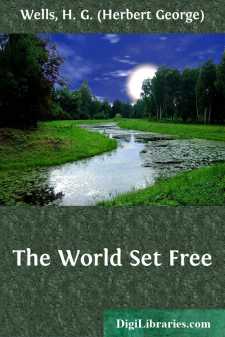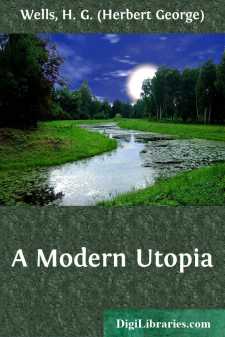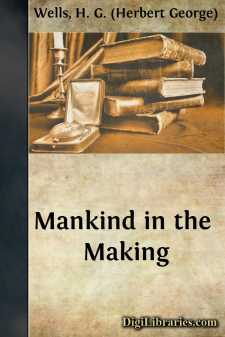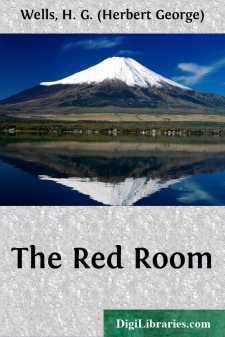Categories
- Antiques & Collectibles 13
- Architecture 36
- Art 48
- Bibles 22
- Biography & Autobiography 815
- Body, Mind & Spirit 144
- Business & Economics 28
- Children's Books 18
- Children's Fiction 14
- Computers 4
- Cooking 94
- Crafts & Hobbies 4
- Drama 346
- Education 58
- Family & Relationships 59
- Fiction 11834
- Games 19
- Gardening 17
- Health & Fitness 34
- History 1378
- House & Home 1
- Humor 147
- Juvenile Fiction 1873
- Juvenile Nonfiction 202
- Language Arts & Disciplines 89
- Law 16
- Literary Collections 686
- Literary Criticism 179
- Mathematics 13
- Medical 41
- Music 40
- Nature 179
- Non-Classifiable 1768
- Performing Arts 7
- Periodicals 1453
- Philosophy 65
- Photography 2
- Poetry 896
- Political Science 203
- Psychology 44
- Reference 154
- Religion 515
- Science 126
- Self-Help 85
- Social Science 82
- Sports & Recreation 34
- Study Aids 3
- Technology & Engineering 59
- Transportation 23
- Travel 463
- True Crime 29
H. G. (Herbert George) Wells
Herbert George Wells, commonly known as H.G. Wells, was an English writer renowned for his pioneering works in science fiction, such as "The War of the Worlds," "The Time Machine," and "The Invisible Man." Born in 1866, Wells was also a prolific social commentator and historian, whose writings often explored the impact of science and technology on society. His literary contributions have left a lasting legacy, influencing numerous authors and the genre of science fiction as a whole.
Author's Books:
Sort by:
I. THE ISONZO FRONT1My first impressions of the Italian war centre upon Udine. So far I had had only a visit to Soissons on an exceptionally quiet day and the sound of a Zeppelin one night in Essex for all my experience of actual warfare. But my bedroom at the British mission in Udine roused perhaps extravagant expectations. There were holes in the plaster ceiling and wall, betraying splintered laths,...
more...
Section I THE history of mankind is the history of the attainment of external power. Man is the tool-using, fire-making animal. From the outset of his terrestrial career we find him supplementing the natural strength and bodily weapons of a beast by the heat of burning and the rough implement of stone. So he passed beyond the ape. From that he expands. Presently he added to himself the power of the...
more...
OF THE LEGENDARY PAST "LITTLE WARS" is the game of kings—for players in an inferior social position. It can be played by boys of every age from twelve to one hundred and fifty—and even later if the limbs remain sufficiently supple—by girls of the better sort, and by a few rare and gifted women. This is to be a full History of Little Wars from its recorded and authenticated beginning until...
more...
This book is in all probability the last of a series of writings, of which—disregarding certain earlier disconnected essays—my Anticipations was the beginning. Originally I intended Anticipations to be my sole digression from my art or trade (or what you will) of an imaginative writer. I wrote that book in order to clear up the muddle in my own mind about innumerable social and political questions,...
more...
I SAW a gray-haired man, a figure of hale age, sitting at a desk and writing. He seemed to be in a room in a tower, very high, so that through the tall window on his left one perceived only distances, a remote horizon of sea, a headland and that vague haze and glitter in the sunset that many miles away marks a city. All the appointments of this room were orderly and beautiful, and in some subtle...
more...
I want very much to set down my thoughts and my experiences of life. I want to do so now that I have come to middle age and now that my attitudes are all defined and my personal drama worked out I feel that the toil of writing and reconsideration may help to clear and fix many things that remain a little uncertain in my thoughts because they have never been fully stated, and I want to discover any...
more...
The present writer has long been deeply interested in the Socialist movement in Great Britain and America, and in all those complicated issues one lumps together as “social questions.” In the last few years he has gone into it personally and studied the Socialist movement closely and intimately at first hand; he has made the acquaintance of many of its leaders upon both sides of the Atlantic,...
more...
PREFACE It may save misunderstanding if a word or so be said here of the aim and scope of this book. It is written in relation to a previous work, Anticipations, [Footnote: Published by Harper Bros.] and together with that and a small pamphlet, "The Discovery of the Future," [Footnote: Nature, vol. lxv. (1901-2), p. 326, and reprinted in the Smithsonian Report for 1902] presents a general...
more...
"It's your own choosing," said the man with the withered arm once more. I heard the faint sound of a stick and a shambling step on the flags in the passage outside. The door creaked on its hinges as a second old man entered, more bent, more wrinkled, more aged even than the first. He supported himself by the help of a crutch, his eyes were covered by a shade, and his lower lip, half...
more...
THE DOOR IN THE WALL I One confidential evening, not three months ago, Lionel Wallace told me this story of the Door in the Wall. And at the time I thought that so far as he was concerned it was a true story. He told it me with such a direct simplicity of conviction that I could not do otherwise than believe in him. But in the morning, in my own flat, I woke to a different atmosphere, and as I lay in...
more...











